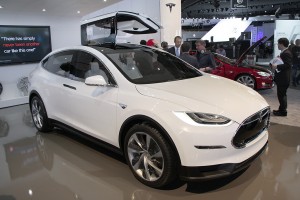Don’t expect to see a profit from Tesla Motors – at least not using generally accepted accounting rules – until at least 2020, CEO Elon Musk cautioned during an appearance in Detroit on Tuesday. That’s despite a big jump in sales the company founder is predicting.
By the end of the decade, Musk is promising to sell at least 500,000 vehicles annually – a nearly 3,000% increase over 2014’s total of 17,300 Model S sedans — as Tesla adds new products and works out the admitted kinks in its production system.
In the meantime, Musk says he’ll be sticking around to oversee Tesla, at least until it gets its first mass market battery-car, the Model III, into production. Musk suggested that he intends to stay at Tesla “until I die,” but opened the door to turning over the role of chief executive to someone else once he reaches his most immediate goal of bring an electric vehicle to the masses.
“What I really enjoy is product development and engineering,” he said, noting it’s in Tesla’s development labs where he spends “80%” of his time.
The darling of Wall Street only a matter of months ago, Tesla has seen its shares tumble from a 52-week high of $291.42 to just $204.25 at the end of Tuesday trading. And the stock plunged by about 6% in after-hours trading due to comments Musk made about the brand’s unexpectedly slow start-up in the otherwise booming Chinese market.
Analysts have raised a number of questions, and Musk acknowledged there are some issues that need to be addressed during his appearance at the Automotive News World Congress.
(Catch all the previews and news at the 2015 North American International Auto Show. Click Here.)

For Tesla to meet its ambitious goals and satisfy increasingly wary investors will require finally getting the Model X into production.
For one thing, the battery carmaker is struggling to ramp up production to meet even its current level of demand. That is a key issue Musk said Tesla is working on. There’ve also been problems meeting initially optimistic sales forecasts for China.
Then there are financial concerns. Tesla has reported a number of profitable quarters. But that’s using bookkeeping procedures that don’t fully comply with Generally Accepted Accounting Principles, or GAAP.
“I think we’ll be profitable before (2020) on a non-GAAP basis, but I’m not sure we’ll be profitable on a GAAP basis,” he acknowledged, downplaying such concerns by noting that Tesla will be investing “all of its cash flow” in new products and technology, at least through the end of the decade.
Reaching the 500,000 sales mark, he said, will be sufficient to put Tesla into the black using the tougher GAAP rules.
Not everyone is convinced the Silicon Valley firm will reach that ambitious sales goal, especially if fuel prices remain at current levels, less than half their recent peak. That has led to a measurable shift in the overall U.S. new car market, away from alternative fuel an compact vehicles to pickups and other fuel-hungry products. For his part, Musk said the impact on Tesla has and will be minor.
“Tesla’s success is assured,” he confidently predicted, adding “It’s just a question of magnitude.”
Rather than remain a niche player, at perhaps 100,000 vehicles annually, he said the goal is to reach 500,000 by decade’s end, and “a couple million cars by 2025.
Asked about plans by General Motors to produce its own long-range, lower-cost battery car, the Chevrolet Bolt, Musk said he didn’t see it as a direct competitor, and noted Tesla wants to see more players in the battery-car space to help validate the technology.
(GM could target Tesla with Chevy Bolt. Click Here for more on the long-range Chevrolet battery-car.)
Noting last year’s decision to let other automakers use Tesla’s patents freely, Musk said, We’re doing everything we can to encourage other carmakers to build electric vehicles,” adding that, “The opportunity for electric transport is tremendous.”
One-time ally Toyota has been questioning that assumption openly, suggesting that the future of clear mobility is more likely to center around hydrogen fuel cells. But Musk called that idea, “silly,” insisting that even the best fuel cells are nowhere as efficient or effective as batteries.
(Hyundai unveils hybrid and plug-in versions of Sonata sedan. Click Herefor a closer look.)
A real test for Tesla will come later this year when it finally gets its Model X battery SUV into production – two years late, a reporter noted.
“I’ve always had a problem with punctuality,” Musk joked before getting more serious and conceding “With Model X it’s been two steps forward and one step backward. We’ve had a lot of distractions.”
Delaying the Model X again would raise even more concerns about Tesla, so it will be hard-pressed to deliver this year and show that it really is on track to meet Musk’s ambitious goals.
(Paul A. Eisenstein contributed to this report.)


No profitability until 2020… Ya think?
1.7 BILLION in the hole in 2014, at that rate, the Chinese won’t even be able to bail him out. Then again he could use his own money…….